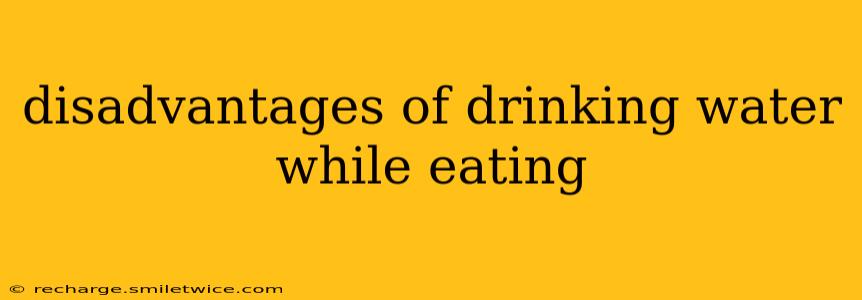The age-old debate: should you drink water while eating? Many believe it dilutes digestive juices, hindering nutrient absorption. Others claim it aids digestion. Let's delve into the potential disadvantages of drinking water while eating, separating fact from fiction.
While there isn't conclusive scientific evidence definitively proving widespread harm, certain potential drawbacks exist, particularly depending on individual factors and the quantity of water consumed.
Does Drinking Water While Eating Dilute Digestive Juices?
This is a common concern. The argument is that diluting stomach acid reduces the efficiency of breaking down food, potentially leading to indigestion or nutrient malabsorption. However, the stomach produces a considerable amount of hydrochloric acid, and the volume of water consumed during a meal is unlikely to significantly alter its overall concentration, especially if consumed in moderation. The body is remarkably adept at regulating its internal chemistry. While excessive water intake could theoretically dilute digestive enzymes, this is more likely to occur with excessive consumption than a few sips throughout a meal.
Can Drinking Water While Eating Interfere with Nutrient Absorption?
The relationship between water intake and nutrient absorption is complex. While some nutrients are fat-soluble and require fat for optimal absorption, drinking water itself doesn't directly interfere with this process. However, over-dilution of digestive enzymes, as mentioned above, could theoretically impact nutrient absorption, although this requires significant water consumption to be a serious concern. Many individuals drink water with meals without experiencing noticeable nutrient deficiencies.
Bloating and Digestive Discomfort: A Common Complaint
This is perhaps the most frequently cited disadvantage. Drinking excessive amounts of water with a meal can lead to feelings of bloating and fullness. This is because increased stomach volume puts pressure on the abdominal organs. This isn't necessarily due to the water itself but rather the increased volume within the digestive tract. This effect is amplified by consuming carbonated drinks with meals.
What about drinking water before a meal?
This is often recommended to promote satiety and help with weight management. Drinking water before a meal can make you feel fuller, potentially leading to reduced calorie intake. However, it's crucial to avoid overdoing it, as excessive water intake can be uncomfortable.
What about drinking water after a meal?
This is generally considered more beneficial than drinking during a meal, as it allows your digestive system to efficiently process the food without experiencing the potential drawbacks mentioned above. Drinking water after eating can aid digestion and prevent constipation.
How Much Water is Too Much While Eating?
There's no magic number. Individual tolerances vary. The key is moderation. Sipping small amounts of water throughout your meal to help swallow is generally fine for most people. However, gulping down large quantities of water with every bite can lead to the negative effects mentioned above. Listen to your body; if you feel bloated or uncomfortable, reduce your water intake during meals.
In Conclusion: A Balanced Approach
The impact of drinking water while eating is highly individualized. While significant negative consequences are unlikely from moderate water consumption, excessive intake can lead to bloating and discomfort. Moderate consumption throughout a meal is usually harmless. Pay attention to your body's signals and adjust your water intake accordingly. A balanced approach, focusing on overall hydration and mindful eating habits, is always best.
